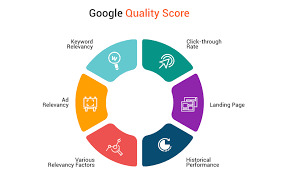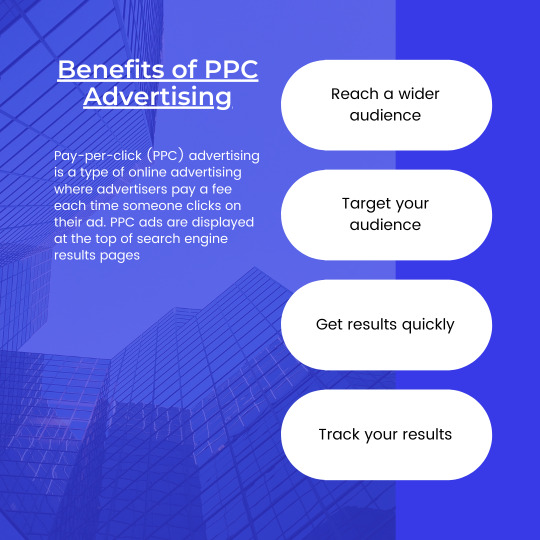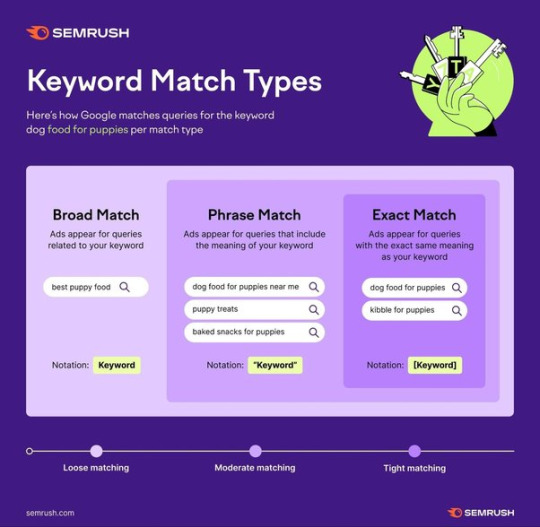#google ads keywords
Text
Understanding Keyword Match Types in Google Ads
Understanding keyword match types is essential for optimizing your Google Ads campaigns effectively. These match types dictate how closely a user's search query must align with your selected keywords for your ads to be triggered. Broad match casts a wide net, displaying your ads for various related searches, including synonyms and misspellings, maximizing reach but potentially leading to less relevant clicks. Modified broad match adds specificity by requiring certain keywords to be present in the search query, striking a balance between reach and relevance. Phrase match ensures your ads appear for search queries containing the exact phrase or close variations of it, offering more control over relevance. Exact match narrows targeting further, displaying ads only for searches that match your keywords exactly or close variations, providing precision targeting. Broad match modifier adds flexibility by requiring specific keywords to be present but allowing variations in word order. Choosing the right match types is crucial for optimizing campaign performance, balancing reach with relevance to maximize ROI. Experimenting with different match types and monitoring campaign metrics enables fine-tuning for optimal results in reaching your target audience.
0 notes
Text
Google is (still) losing the spam wars to zombie news-brands

I'm touring my new, nationally bestselling novel The Bezzle! Catch me TONIGHT (May 3) in CALGARY, then TOMORROW (May 4) in VANCOUVER, then onto Tartu, Estonia, and beyond!

Even Google admits – grudgingly – that it is losing the spam wars. The explosive proliferation of botshit has supercharged the sleazy "search engine optimization" business, such that results to common queries are 50% Google ads to spam sites, and 50% links to spam sites that tricked Google into a high rank (without paying for an ad):
https://developers.google.com/search/blog/2024/03/core-update-spam-policies#site-reputation
It's nice that Google has finally stopped gaslighting the rest of us with claims that its search was still the same bedrock utility that so many of us relied upon as a key piece of internet infrastructure. This not only feels wildly wrong, it is empirically, provably false:
https://downloads.webis.de/publications/papers/bevendorff_2024a.pdf
Not only that, but we know why Google search sucks. Memos released as part of the DOJ's antitrust case against Google reveal that the company deliberately chose to worsen search quality to increase the number of queries you'd have to make (and the number of ads you'd have to see) to find a decent result:
https://pluralistic.net/2024/04/24/naming-names/#prabhakar-raghavan
Google's antitrust case turns on the idea that the company bought its way to dominance, spending the some of the billions it extracted from advertisers and publishers to buy the default position on every platform, so that no one ever tried another search engine, which meant that no one would invest in another search engine, either.
Google's tacit defense is that its monopoly billions only incidentally fund these kind of anticompetitive deals. Mostly, Google says, it uses its billions to build the greatest search engine, ad platform, mobile OS, etc that the public could dream of. Only a company as big as Google (says Google) can afford to fund the R&D and security to keep its platform useful for the rest of us.
That's the "monopolistic bargain" – let the monopolist become a dictator, and they will be a benevolent dictator. Shriven of "wasteful competition," the monopolist can split their profits with the public by funding public goods and the public interest.
Google has clearly reneged on that bargain. A company experiencing the dramatic security failures and declining quality should be pouring everything it has to righting the ship. Instead, Google repeatedly blew tens of billions of dollars on stock buybacks while doing mass layoffs:
https://pluralistic.net/2024/02/21/im-feeling-unlucky/#not-up-to-the-task
Those layoffs have now reached the company's "core" teams, even as its core services continue to decay:
https://qz.com/google-is-laying-off-hundreds-as-it-moves-core-jobs-abr-1851449528
(Google's antitrust trial was shrouded in secrecy, thanks to the judge's deference to the company's insistence on confidentiality. The case is moving along though, and warrants your continued attention:)
https://www.thebignewsletter.com/p/the-2-trillion-secret-trial-against
Google wormed its way into so many corners of our lives that its enshittification keeps erupting in odd places, like ordering takeout food:
https://pluralistic.net/2023/02/24/passive-income/#swiss-cheese-security
Back in February, Housefresh – a rigorous review site for home air purifiers – published a viral, damning account of how Google had allowed itself to be overrun by spammers who purport to provide reviews of air purifiers, but who do little to no testing and often employ AI chatbots to write automated garbage:
https://housefresh.com/david-vs-digital-goliaths/
In the months since, Housefresh's Gisele Navarro has continued to fight for the survival of her high-quality air purifier review site, and has received many tips from insiders at the spam-farms and Google, all of which she recounts in a followup essay:
https://housefresh.com/how-google-decimated-housefresh/
One of the worst offenders in spam wars is Dotdash Meredith, a content-farm that "publishes" multiple websites that recycle parts of each others' content in order to climb to the top search slots for lucrative product review spots, which can be monetized via affiliate links.
A Dotdash Meredith insider told Navarro that the company uses a tactic called "keyword swarming" to push high-quality independent sites off the top of Google and replace them with its own garbage reviews. When Dotdash Meredith finds an independent site that occupies the top results for a lucrative Google result, they "swarm a smaller site’s foothold on one or two articles by essentially publishing 10 articles [on the topic] and beefing up [Dotdash Meredith sites’] authority."
Dotdash Meredith has keyword swarmed a large number of topics. from air purifiers to slow cookers to posture correctors for back-pain:
https://housefresh.com/wp-content/uploads/2024/05/keyword-swarming-dotdash.jpg
The company isn't shy about this. Its own shareholder communications boast about it. What's more, it has competition.
Take Forbes, an actual news-site, which has a whole shadow-empire of web-pages reviewing products for puppies, dogs, kittens and cats, all of which link to high affiliate-fee-generating pet insurance products. These reviews are not good, but they are treasured by Google's algorithm, which views them as a part of Forbes's legitimate news-publishing operation and lets them draft on Forbes's authority.
This side-hustle for Forbes comes at a cost for the rest of us, though. The reviewers who actually put in the hard work to figure out which pet products are worth your money (and which ones are bad, defective or dangerous) are crowded off the front page of Google and eventually disappear, leaving behind nothing but semi-automated SEO garbage from Forbes:
https://twitter.com/ichbinGisele/status/1642481590524583936
There's a name for this: "site reputation abuse." That's when a site perverts its current – or past – practice of publishing high-quality materials to trick Google into giving the site a high ranking. Think of how Deadspin's private equity grifter owners turned it into a site full of casino affiliate spam:
https://www.404media.co/who-owns-deadspin-now-lineup-publishing/
The same thing happened to the venerable Money magazine:
https://moneygroup.pr/
Money is one of the many sites whose air purifier reviews Google gives preference to, despite the fact that they do no testing. According to Google, Money is also a reliable source of information on reprogramming your garage-door opener, buying a paint-sprayer, etc:
https://money.com/best-paint-sprayer/
All of this is made ten million times worse by AI, which can spray out superficially plausible botshit in superhuman quantities, letting spammers produce thousands of variations on their shitty reviews, flooding the zone with bullshit in classic Steve Bannon style:
https://escapecollective.com/commerce-content-is-breaking-product-reviews/
As Gizmodo, Sports Illustrated and USA Today have learned the hard way, AI can't write factual news pieces. But it can pump out bullshit written for the express purpose of drafting on the good work human journalists have done and tricking Google – the search engine 90% of us rely on – into upranking bullshit at the expense of high-quality information.
A variety of AI service bureaux have popped up to provide AI botshit as a service to news brands. While Navarro doesn't say so, I'm willing to bet that for news bosses, outsourcing your botshit scams to a third party is considered an excellent way of avoiding your journalists' wrath. The biggest botshit-as-a-service company is ASR Group (which also uses the alias Advon Commerce).
Advon claims that its botshit is, in fact, written by humans. But Advon's employees' Linkedin profiles tell a different story, boasting of their mastery of AI tools in the industrial-scale production of botshit:
https://housefresh.com/wp-content/uploads/2024/05/Advon-AI-LinkedIn.jpg
Now, none of this is particularly sophisticated. It doesn't take much discernment to spot when a site is engaged in "site reputation abuse." Presumably, the 12,000 googlers the company fired last year could have been employed to check the top review keyword results manually every couple of days and permaban any site caught cheating this way.
Instead, Google is has announced a change in policy: starting May 5, the company will downrank any site caught engaged in site reputation abuse. However, the company takes a very narrow view of site reputation abuse, limiting punishments to sites that employ third parties to generate or uprank their botshit. Companies that produce their botshit in-house are seemingly not covered by this policy.
As Navarro writes, some sites – like Forbes – have prepared for May 5 by blocking their botshit sections from Google's crawler. This can't be their permanent strategy, though – either they'll have to kill the section or bring it in-house to comply with Google's rules. Bringing things in house isn't that hard: US News and World Report is advertising for an SEO editor who will publish 70-80 posts per month, doubtless each one a masterpiece of high-quality, carefully researched material of great value to Google's users:
https://twitter.com/dannyashton/status/1777408051357585425
As Navarro points out, Google is palpably reluctant to target the largest, best-funded spammers. Its March 2024 update kicked many garbage AI sites out of the index – but only small bottom-feeders, not large, once-respected publications that have been colonized by private equity spam-farmers.
All of this comes at a price, and it's only incidentally paid by legitimate sites like Housefresh. The real price is borne by all of us, who are funneled by the 90%-market-share search engine into "review" sites that push low quality, high-price products. Housefresh's top budget air purifier costs $79. That's hundreds of dollars cheaper than the "budget" pick at other sites, who largely perform no original research.
Google search has a problem. AI botshit is dominating Google's search results, and it's not just in product reviews. Searches for infrastructure code samples are dominated by botshit code generated by Pulumi AI, whose chatbot hallucinates nonexistence AWS features:
https://www.theregister.com/2024/05/01/pulumi_ai_pollution_of_search/
This is hugely consequential: when these "hallucinations" slip through into production code, they create huge vulnerabilities for widespread malicious exploitation:
https://www.theregister.com/2024/03/28/ai_bots_hallucinate_software_packages/
We've put all our eggs in Google's basket, and Google's dropped the basket – but it doesn't matter because they can spend $20b/year bribing Apple to make sure no one ever tries a rival search engine on Ios or Safari:
https://finance.yahoo.com/news/google-payments-apple-reached-20-220947331.html
Google's response – laying off core developers, outsourcing to low-waged territories with weak labor protections and spending billions on stock buybacks – presents a picture of a company that is too big to care:
https://pluralistic.net/2024/04/04/teach-me-how-to-shruggie/#kagi
Google promised us a quid-pro-quo: let them be the single, authoritative portal ("organize the world’s information and make it universally accessible and useful"), and they will earn that spot by being the best search there is:
https://www.ft.com/content/b9eb3180-2a6e-41eb-91fe-2ab5942d4150
But – like the spammers at the top of its search result pages – Google didn't earn its spot at the center of our digital lives.
It cheated.

If you'd like an essay-formatted version of this post to read or share, here's a link to it on pluralistic.net, my surveillance-free, ad-free, tracker-free blog:
https://pluralistic.net/2024/05/03/keyword-swarming/#site-reputation-abuse

Image:
freezelight (modified)
https://commons.wikimedia.org/wiki/File:Spam_wall_-_Flickr_-_freezelight.jpg
CC BY-SA 2.0
https://creativecommons.org/licenses/by-sa/2.0/deed.en
#pluralistic#google#monopoly#housefresh#content mills#sponcon#seo#dotdash meredith#keyword swarming#iac#forbes#forbes advisor#deadspin#money magazine#ad practicioners llc#asr group holdings#sports illustrated#advon#site reputation abuse#the algorithm tm#core update#kagi#ai#botshit
842 notes
·
View notes
Text
Why Does Quality Score Matter for Google Ads?

Hello Everyone, I saw this blog on SEO Duke and this Blog is based on Quality Score Matter for Google Ads.
1 note
·
View note
Text
youtube
Boost Your Online Presence with Our Top-Notch Services! 🌟
🔍 SEO Optimization:
Want to climb the search engine ranks? We've got you covered! Our expert team will optimize your website to ensure maximum visibility and drive organic traffic your way.
💡 Social Media Marketing:
Engage with your audience like never before! Our creative strategies will help you build a strong presence on social media platforms, driving brand awareness and boosting customer engagement.
💰 Google Ads Service:
Get ahead of the competition with targeted Google Ads campaigns! From keyword research to ad creation and optimization, we'll help you reach your target audience and maximize your ROI.
Ready to take your online business to new heights? Drop us a message to learn more about our services! 🚀
https://www.linkedin.com/in/anandparikhseo/
#SocialMediaMarketing#GoogleAds#DigitalMarketing#OnlinePresence#seoexpert#seo marketing#seoagency#seoadvice#seo#seoconsultant#seocompany#Hire SEO#Hire SEO Expert#Hire SEO Freelancer#SEO Services#SEO Tips#seo tools#Digital Marketing Expert#Digital Marketing service#social media marketing agency#social media marketing#digital marketing company#website designing#Keywords#Organic SEO#Hire Google ADs Expert#Youtube
2 notes
·
View notes
Text
I will make 50 unique article submission contextual backlinks

Article Submission refers to an off-page SEO technique in which you write an article and publish it on the third-party website. It is a method by which you write articles that are related to your business and add them to the famous contents submission directories.
Get your website published on High DA Site permanently. Articles are effective for improving your google ranking as it increase great authority backlinks.
With my service, you can expect:
Proper formatting and optimization.
Increased online visibility and traffic.
Detailed report of all work.
All links will be done manually. No tool will be used for it.
Permanent link building.
Contextual backlinks.
High DA and PA sites.
Unlimited Keywords and URLs.
100% Approval Sites.
On Time delivery.
Don't miss out on the opportunity to increase your online visibility and drive more traffic to your website.
Order my gig now and let's get started on boosting your online presence!
Order Now > WhatsApp +8801730604878
#article#article submission#seo services#seo backlinks#seo google#seotimerank#seo time rank#backlinks#backlink seo#backlink#link building#ranking#rank website#website ranking#marketing agency#smm services#keyword research#search engine optimization#google ads#usa traffic#seotimerank review#seotimerank smm#seotimerank market#seotimerank app#seotimerank agency#seo agency#digital marketing#online marketing#socialmediamarketing#seo agency seotimerank
4 notes
·
View notes
Text
This is probably just me not knowing how to utilise google correctly but WHY is it so hard to find Western novels about gay men that aren't romance novels
#vent post#not actually a vent lmao but thats the tag#like look#what i WANT to read is basically just;#gunsmoke. except the marshal is gay. nothing else is different#the rest of the story is normal#the focus is not the romance#and WHY is this SO HARD to find!!!!#like COME ON#yes this is user error i dont understand how to google things since they changed the algorithm to be all ads and whatever#but trying to add queer or mlm or whatever to the keyword searchs just brings up romance#and i will not object at all to romances that are a part of the plot#i just#i dont want to read straight romance#i would like to read about cowboys and gunmen and whatever Wild West things bc that is why i am here#and itd be nice if the romance was gay instead of het#ugh#anyway im gonna have to bother the librarians next time i go to the library bc if i have to write this myself i am going to#throw my laptop into the pond#if anyone has any queer and/or mlm western novels to rec lmk pls i need to read things or i will perish
2 notes
·
View notes
Text
How to Discover Low CPC & High Search Volume Keywords for Google Ads?

Welcome to the world of strategic Digital Marketing! In this post, we'll unveil the secrets of finding Keywords for Google Ads with low CPC and high search volume. Get ready to optimize your ad spend, maximize impact, and discover the sweet spot where affordability meets user demand. Let's dive into the art of keyword selection for a more efficient and successful advertising strategy!
Finding Keywords for Google Ads
Keyword Planner: Keyword Planner is a powerful tool that assists advertisers in finding relevant and effective keywords for their Google Ad campaigns. Accessible through the Google Ads platform, the Keyword Planner is designed to help users identify terms and phrases that potential customers are likely to use when searching for products or services.
Discover New Keywords: The "Discover new keywords" feature in Google's Keyword Planner is a tool that helps advertisers explore and identify additional keywords related to their products or services. This feature is valuable for advertisers looking to expand their keyword list, discover new opportunities, and get insights into potential performance.
Get Search Volume & Forecast: This is a powerful Google Keyword Planner tool that provides advertisers with valuable insights into the potential performance of their selected keywords. After adding keywords click on 'Review Forecast' to access the 'Get Search Volume & Forecast' section.
View Search Volume: This feature in the 'Get Search Volume & Forecast' section will display the average monthly search volume for your selected keywords. This information indicates how often users search for those terms on Google.
Explore Forecast Data: The feature provides forecasting data that estimates how your selected keywords might perform in terms of clicks, impressions, and cost. This includes information on projected performance over time. Analyze the forecasting data to make informed decisions about your keyword selection, bids, and budget.
By leveraging the "Get search volume and forecast" tool in Keyword Planner, advertisers can estimate the potential reach, cost, and performance of their selected keywords, allowing for more strategic decision-making and better campaign planning to discover low CPC & high search volume keywords for Google Ads.
2 notes
·
View notes
Text
What is SEO ................?
Hi Guys! I am Masiur Rahman before you. I am professional Digital Marketer and SEO Expert. I will manage any kind of social media ( Facebook, Twitter, Instagram, Tumblr, Linkedin, Reddit, Pinterest etc. ). I will create Twitter & Facebook Ads Campaign & Boosting. Also I will do SEO ( Search Engine Optimization ). like: On-page SEO, Of-page SEO, Technical SEO, Keyword Research, Competitor Analysis, Google Search Console, Google Analytics.
#seo tools#social marketing#seo expert#smm services#social media marketing#keyword research#online marketing#seo optimization#backlinks#emailmarketing#youtube marketing#seo marketing#seo#seo services#seo agency#local seo#google ads#google search console#google search results#google search api#search engine#marketing#copywriting#networking
2 notes
·
View notes
Text

Do's and Don'ts for Google Ads Success:
👍DO: Research keywords thoroughly
👍DO: Create compelling ad copy
👍 DO: Set a clear budget and goals
👍 DO: Monitor and optimize regularly
👍 DO: Use ad extensions wisely
🚫 DON'T: Neglect negative keywords
🚫 DON'T: Ignore landing page quality
🚫 DON'T: Overlook mobile optimization
🚫 DON'T: Run ads without A/B testing
🚫 DON'T: Forget to track conversions
For more such tips, follow @dreamerzmindz
#dreamerzmindz#Google ads#Paid ads#Keyword research#Landing Page#Mobile Optimzation#Track conversions#Instant Result#Ad Copy#Budget Management#ROI#click through rate#Ad Extension#Digital Marketing#Online Advertising#googleads#paidads#keywordresearch#landingpage#mobileoptimization#trackconversions#instantresult#AdCopy#BudgetManagement#ClickThroughRate#AdExtensions#PPCAdvertising#DigitalMarketing#OnlineAdvertising#AdWords
3 notes
·
View notes
Text
What is Keyword?
(Niketank Mogha)
You came on this article to know What is Keyword. so lets start, If you only take information from the internet, then you would hardly know that What is Keyword? But if you are a blogger or digital marketer and want to make your career in the field of digital marketing, then you must have heard the word Keyword and You need to know about What is Keyword? (Niketank Mogha)
You may have seen many videos, read articles in which keywords have been mentioned. But if you have not yet understood What is Keyword. are, what are the types of keywords and what is keyword research, then after reading this article all your doubts will be cleared.
In this article, I have given you complete information about What is Keyword in very simple words, I am sure that after reading this article till the end, all the doubts related to your keywords are going to be removed, so definitely read this article till the end.
(Niketank Mogha)
So let’s start this wonderful article first of all.
What is Keyword?
To get information from the Internet, the same words that a user uses to find information or to access information are called keywords.
The way of searching information of every internet user is different. Means every user searches for information on the Internet using different types of words. A keyword is formed when the same word is searched thousands of times.
Now you have a clean, simple, short and point to point defination of What is Keyword and you have understood very well that What is Keyword.
Types of Keywords?
Now you know What is Keyword. so now I will tell you types of Keyword. There are many types of keywords. There are some given below:
1)Fresh Keyword:
Fresh Keywords are keywords that are searched a lot for some time, meaning keywords related to trending topics come under the category of fresh keywords. Fresh keywords are not searched for a long time, they are searched for only a few time periods.
2) Ever Green Keyword:
The most frequently searched keywords are Ever Green Keywords. These keyword categories have been searched in the past, are being searched currently, and will continue to be searched. Ever Green Keyword continues to have a high search volume.
For Example: How to make money online, How to start business etc
3) Area Targeting Keyword:
Area Targeting Keyword are such keywords in which any one area is targeted.
For example – keywords like Delhi Metro Root, Website Designing Course in Delhi, Data Entry Jobs in Mumbai, Jobs in Delhi, SSC course in Mumbai, Digital Marketing course in Delhi etc. are called Aria Targeting Keyword.
If you do your business in any one area or write about any one area, then Area Targeting Keyword can be very beneficial for you.
4) Customer Targeting Keyword:
Client Targeting Such keywords include those that directly target a certain buyer. A few examples are the Best Laptop Bag for Men, Best Shoes for Men, Best Cricket Bat for U-16 Boy, Sleepers for Women, Sunglasses for Women and Best Cricket Kit Bag for Men.
5) Product Targeting Keyword
Product Targeting Keyword are keywords that target a particular product. Like – keywords like Boat Watch For Man, Micromax Smartphone, Apple Phones, Samsung Tablets etc.
6) LSI Keyword (Latent Semantic Indexing)
LSI Keyword are those keywords which are related to our Main Keyword. The main reason for using LSI keywords in our articles is that our articles rank on these keywords as well, and we get good traffic. We also call these keywords as secondary keywords. LSI keywords are very important in the ranking of articles. That’s why these keywords should always be used in the article.
For example you are writing an article on “What is Computer”. So this will be your focus keywords. You can add more details in your article like Computer History, Types of Computer, Old Generation Computer vs Today’s Generation computer so these words are related to your main keyword. You can use these keywords in your article to gain more traffic as a related keyowords on your post or website. (What is Digital Marketing?)
What is Keyword Research?
After reading the article till here, you must have understood that What is Keyword, now know what is Keyword Research. Because a blogger should have knowledge about keyword research
Keyword research is very important for a blogger. When you write your article on any topic, first you have to do keyword research in a good way. You have to see how many people search the keyword you have selected, how much competition is there and how much CPC you are getting on that keyword.
When you write articles by researching keywords well, then only traffic comes to your blog, and when there is traffic on your blog, then only you can earn money from blogging.
If you work on keywords that people do not search, then no matter how hard you work on the blog, traffic will not come to your blog. Understand that writing articles without keyword research is like shooting in the dark.
You will find many free keyword research tools on the internet, with the help of which you can do keyword research for your blog. Like – Ubersuggest, Wordtracker etc.
Types of keywords based on keyword research
Whenever we do keyword research, we find 3 types of keywords –
1 – Short Tale Keywords
Such keywords in which 1 to 3 words are used are called Short Tale Keyword. Search volume is very high in short tail keywords and competition is also very high in these keywords.
If you are new in the field of blogging then you should not work on short tail keywords. Because working on short tail keywords will take a lot of time for your website to rank.
Example – Mobile Phone, Samsung Phone, Samsung Galaxy, Samsung Smart Phone, Biryani Recipe All such keywords are called Short Tale Keywords.
2 – Mid Tale Keyword (Niketank Mogha)
Mid Tale Keywords are the keywords that use three to five words. Both Search Volume and Competition are lower for these keywords than for Short Tale Keywords.
Examples are the Top 5 Best Samsung Phones, Smart Phones Under 5000, and Biryani Kaise Banate hai. Mid Tale Keyword is the name given to this kind of keyword.
3 – Long Tale Keyword
Long-tail keywords are those that contain more than five words. Long Tale Keyword has a lower search volume, but its benefit is that it has very little competition. Your post will rank higher if you focus on long-tail keywords. New bloggers might benefit from using long-tail keywords.
Examples are the Samsung Galaxy Note III Price in India and the Best Smart Phone Under 5000 in India. All of these are long-tailed keywords.
How to do Keyword Research.
Steps to do Keyword Research. (Niketank Mogha)
Step 1: First, you need to define your target audience
Prior to beginning your keyword research, it’s critical to establish your objectives and pinpoint your target market. Establish the goal of your website or content and be aware of your target audience. To create a complete keyword strategy that appeals to your audience, take into account their demographics, interests, and pain concerns.
Step 2: Brainstorm Seed Keywords (Niketank Mogha)
Create a list of the seed keywords associated with your company, sector, or subject. These are the key words that best characterise your offerings in terms of goods, services, or content. Consider the terms or phrases that members of your audience may use to obtain information about your services if you put yourself in their position. Find out what’s hot right now by using resources like Google Trends, industry forums, and social media.
Step 3: Expand Your Keyword List (Niketank Mogha)
When you have your seed keywords, you may now generate related keywords to grow your list. To help you with this procedure, a number of tools are available. Popular options that offer helpful information on search traffic, competition, and associated keywords include Google’s Keyword Planner, SEMrush, Ahrefs, and Moz Keyword Explorer. To catch a larger range of search queries, aim for a healthy blend of long-tail keywords (particular, longer phrases) and short-tail keywords (broader, shorter phrases).
Step 4: Analyze Keyword Metrics (Niketank Mogha)
As soon as you have a complete list of keywords, it’s critical to examine their metrics to ascertain their potential worth. Search volume and keyword difficulty should be your primary focus. In contrast to keyword difficulty, which measures the amount of competition for a certain phrase, search volume shows how frequently a keyword is searched. Targeting keywords that have a strong return on investment (ROI) in terms of traffic and ranking potential requires striking a balance between high search volume and reasonable keyword difficulty.
Step 5: Evaluate Competitor Strategies
To learn more about the keyword tactics of your niche’s top rivals, analyse their websites and top rankings. Determine the keywords they are aiming for and how they use them in their material. You may improve your own approach and find new keyword chances with the aid of our study. Competitor analysis capabilities are available in tools like SEMrush and Ahrefs, and they give useful information on keyword rankings, backlinks, and content gaps.
Step 6: Refine and Prioritize Your Keyword List
Based on the insights gained from your keyword analysis and competitor research, it’s time to refine and prioritize your keyword list. Weed out irrelevant or low-value keywords and focus on those that align with your goals, have decent search volume, and offer a reasonable chance of ranking. Group keywords into relevant themes or topics to facilitate content planning and organization.
Step 7: Create High-Quality Content
Armed with your refined keyword list, start creating high-quality content that aligns with your keywords and provides value to your audience. Incorporate keywords naturally into your titles, headings, body text, and meta tags. However, ensure that your content remains informative, engaging, and readable for human readers rather than solely focusing on search engines. Remember, quality content that meets the user intent is more likely to rank well and attract organic traffic.
Conclusion:
In the Keyword research is an ongoing process, you need for continuous monitoring, analysis, and adaptation. By understanding your audience, search and identify relevant keywords, and creating high-quality content for your audience to get more traffic on your blog or website.
After reading this article, whatever doubts you have about What is Keyword, they must have gone away and you must have understood that Keyword Kya Hota Hai and how important they are to improve the ranking of any website. Hello friends, you must have liked this article written by me. In the end, you are requested to share this article with your friends on social media.
(Niketank Mogha)
#keyword#seo#google ads#digital marketing#website designing#web development#social media marketing#cheap website design#Youtube
2 notes
·
View notes
Text
Why should I advertise on Google?
Here are some reasons why you should advertise on Google:
Reach a large audience. Google is the most popular search engine in the world, with over 92% of the global market share. This means that your ads have the potential to reach a large number of people who are actively looking for businesses like yours.
Target your ads. With Google Ads, you can target your ads to specific demographics, interests, and even keywords. This means that your ads will only be shown to people who are likely to be interested in what you have to offer.
Get results quickly. Google Ads is a pay-per-click (PPC) advertising platform, which means that you only pay when someone clicks on your ad. This makes it a very cost-effective way to reach new customers and generate leads.
Track your results. Google Ads provides detailed reports that show you how many people have seen your ads, how many have clicked on them, and how many have taken the desired action, such as visiting your website or calling your business. This information can help you to optimize your campaigns and get the most out of your advertising budget.
Overall, Google Ads is a powerful tool that can help you to reach new customers, generate leads, and grow your business. If you're not already advertising on Google, I encourage you to give it a try.
Here are some additional tips for creating effective Google Ads:
Write clear and concise ad copy. Your ad copy should be clear, concise, and persuasive. It should highlight the benefits of your products or services and explain why people should click on your ad.
Use relevant keywords. When you're creating your ad campaign, you'll need to choose relevant keywords. These are the words and phrases that people are likely to use when they're searching for businesses like yours.
Set a budget. Google Ads allows you to set a daily budget for your ad campaigns. This will help you to control your spending and avoid overspending.
Track your results. As I mentioned earlier, Google Ads provides detailed reports that show you how your campaigns are performing. This information can help you to optimize your campaigns and get the most out of your advertising budget.
Click to Hire a Google Advertising Expert...
#google ads#google adsense#google ads certification#google ads account#google ads manager#google ads keyword planner#google ads mcc#google ads settings#google ads editor#google ads help#google ads api#google ads account suspended#google ads academy#google ads agency#google ads analytics#are google ads worth it#average cpc google ads#attribution model google ads#affiliate marketing google ads#are google ads free#api google ads#auction insights google ads#about google ads#google ads blog#google ads business#google ads budget#google ads bidding strategies#google ads best practices 2023#benefits of google ads#bidding strategy google ads
6 notes
·
View notes
Text
How to Conduct Keyword Research for Your First Ads Campaign Launch
Conducting effective keyword research is crucial for launching your first ads campaign successfully. Start by brainstorming a list of relevant terms and phrases that potential customers might use when searching for your products or services. Then, utilize keyword research tools like Google Keyword Planner, SEMrush, or Ahrefs to expand your list and identify high-volume, low-competition keywords. Pay attention to search volume, competition level, and keyword relevance to ensure you're targeting terms that align with your campaign goals. Additionally, consider long-tail keywords, which are more specific and often have higher conversion rates. Analyze your competitors' keywords to gain insights and identify opportunities. Once you've compiled a comprehensive list, organize your keywords into relevant ad groups and use them strategically in your ad copy and landing pages. Continuously monitor and refine your keyword strategy based on performance data to optimize your ads campaign for success
0 notes
Text
The benefit of Pay-Per_click (PPC) advertising

Pay-per-click (PPC) advertising is a type of online advertising where advertisers pay a fee each time someone clicks on their ad. PPC ads are displayed at the top of #search_engine results pages (SERPs) when someone searches for a keyword or phrase that is related to the advertiser's product or service.
There are many benefits to using PPC advertising:-
Reach a wider audience: PPC ads can help you reach a wider audience than traditional advertising methods, such as print or television ads. This is because your ads are displayed on search engines, which are visited by millions of people every day.
Target your audience: You can target your PPC ads to specific demographics, interests, and even locations. This means that your ads will only be seen by people who are likely to be interested in what you have to offer.
Get results quickly: PPC ads can help you get results quickly. This is because your ads start showing up as soon as you create them and start bidding on keywords.
Track your results: You can track the results of your PPC campaigns to see how well they are performing. This information can help you optimize your campaigns and get even better results.
If you're looking for a way to reach a wider audience, target your ads, and get results quickly, then PPC advertising is a great option.
Here are some additional benefits of using PPC advertising:
Control your budget: You can control how much you spend on #PPC_advertising by setting a daily budget. This means that you won't overspend on your advertising.
Get more visibility: PPC ads are displayed at the top of SERPs, which gives your business more visibility than traditional advertising methods.
Increase brand awareness: PPC ads can help increase brand awareness by exposing your business to a wider audience.
Generate leads: PPC ads can help generate leads by driving traffic to your website.
Increase sales: PPC ads can help increase sales by converting leads into customers.
If you're looking for a way to grow your business, PPC advertising is a great option. It can help you reach a wider audience, target your ads, get results quickly, control your budget, and increase brand awareness and #sales.
#marketingstrategy#google ads#ppc specialist#digital marketing#search engine marketing#keyword research#social marketing
3 notes
·
View notes
Text
A Real-World Example of PPC Marketing Strategies
New blog! Let's create a real-world example to show how businesses utilize PPC marketing and SEO to connect consumers and what they search for with what marketers are looking to promote.
by Kimberly Eugene, 05/04/2023
Photo by Pixabay on Pexels.com
Search engine marketing (SEM) and search engine optimization (SEO) tools are being used increasingly by marketers to reach their customers due to their ability to connect consumers to what they search for with what marketers are looking to promote. The two main tactics within SEM are pay-per-click (PPC) advertising and SEO, and…

View On WordPress
#ads#Adwords#bidding strategy#bounce rate#click-through rate#content marketing#conversion rate#conversions#cost-per-acquisition#cost-per-mille#CPA#CPM#CTR#CVR#digital marketing#Google Ads#Google Ads preview tool#Google Analytics#keyword research#keywords#Kimberly Eugene#marketing#negative keywords#pay-per-click#PPC#PPC Marketing#PRTYNVRNDS LLC#real world example#return on investment#ROI
2 notes
·
View notes
Text
Keywords Match Types for Google Ads
Keywords Match Types for Google Ads
Keyword Match Types : What is it?
Keyword Match Types are very important when building your ads.
Keyword Match Type means to what extend you would like your keywords to match a search term. Your keywords reflect your products or services, and the search terms are what people are looking for on search engine.
To simplify : you want to tell Google to what extent someone searching for something…

View On WordPress
3 notes
·
View notes
Text
How does keyword refinement help your Google Ads services to perform better?
Keyword refinement is an important part of any Google Ads services. It can help your services perform better by allowing you to target the right people with the right message.
First, keyword refinement helps you focus on the most relevant search terms when setting up your campaigns. You can use different keywords to target different types of people or different demographics.
For example, if you're offering a product or service for seniors, you can use keywords like "senior care" or "aging services" to target people in that demographic.
Second, keyword refinement also helps you optimize your budget when setting up campaigns. By using the most relevant keywords, you can ensure that you're not spending too much on keywords that are unlikely to generate conversions.
Additionally, you can also adjust your bids on certain keywords to make sure you're getting the maximum return on investment.
Finally, keyword refinement can help you create more effective ad copy. By targeting the right people with the right message, you can increase your click-through rate and ultimately generate more conversions.

Overall, keyword refinement is an important part of any Google Ads services and can help you maximize your return on investment.
By targeting the right people with the right message and optimizing your budget, you can ensure your campaigns are more successful and generate more conversions.
P.S: Visit Digital Marketing Forum for more such insights and specific answers to most [unanswered] questions.
1 note
·
View note